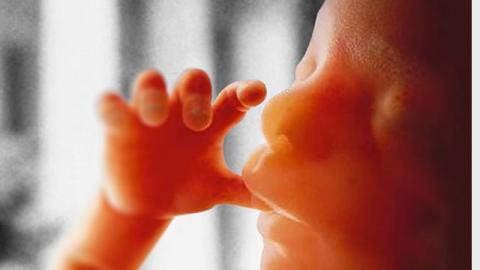
More Millennials Oppose Abortion, But Don't Call Them Pro-Life
New research reveals Millennials' attitudes towards abortion are increasingly unfavorable.
The survey, conducted by the Institute for Pro-Life Advancement questioned more than 800 Millennials in February, 2016.
They found 53% of this generation have a negative view of abortion. Of those, 36% support abortion only in the case of rape, incest or whether the mother's life is at risk. Another 17% believe abortion should not be performed for any reason.
The 53% anti-abortion sentiment among millennials is a nine-point jump in just four years. Back in 2012, 44% of young adults opposed abortion, tied with 44% who favor it.
In the most recent poll, only 17% of the group said abortion should be legal at any point throughout a pregnancy. This is the position held by Hillary Clinton, the presumptive Democratic nominee for President of the United States and Planned Parenthood, America's largest abortion provider.
In an interesting twist, however, many of the millennials who oppose abortion, refuse to identify themselves as pro-life. Only 38% call themselves pro-life, while 53% are against abortion.
Kristan Hawkins, president of Students for Life, told The Washington Times the reason millennials are reluctant to identify as pro-life is because of negative connotations associated with the pro-life brand.
"Over the past 10 years, the image of the pro-life movement has trended younger and more mainstream, but the 'pro-life' brand still carries an image which many people don't want to associate themselves, despite their views on abortion," she said.
For that reason, Hawkins says her organization no longer asks young people if they are pro-life. Rather, instead of asking respondents to associate themselves with a label or an identity marker, millennials are simply asked to express their views about abortion. The latter tends to yield higher anti-abortion sentiment.
While the pro-life movement is experiencing a branding problem among this younger demographic, so is the pro-choice movement.
Millennials who favor abortion rights are often hesitant to identify themselves pro-choice, because of the negative connotations associated with that label. Pro-abortion activists are aware of this trend, and are now moving toward a different image: marketing their movement as pro-women.
This has limited success because of resistance from the anti-abortion movement that is also trying to capitalize on the pro-women image. For example, the #WomenBetrayed campaign brought attention to the abuses of women undergoing abortions, both as patients and the handling of body parts of aborted fetuses by Planned Parenthood as exposed in undercover videos.
When it comes to Planned Parenthood specifically, fewer of these younger tax-payers approve of federal funding for the organization. 47% of respondents said the abortion provider continue to receive some taxpayer money, compared to 66% who supported it just one year ago.
"When Americans see what happens behind the closed doors of Planned Parenthood facilities across the country, their support drops dramatically as they realize Planned Parenthood's modus operandi is incongruous with the image they project of being an advocate for women's health," according to comments accompanying the survey.



